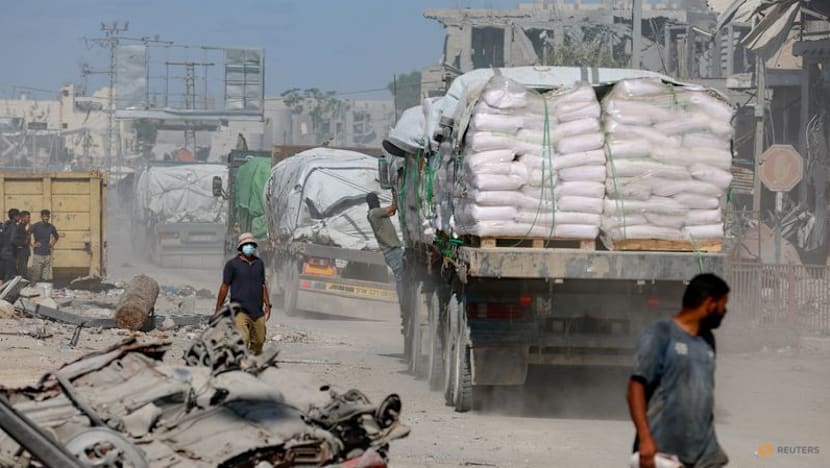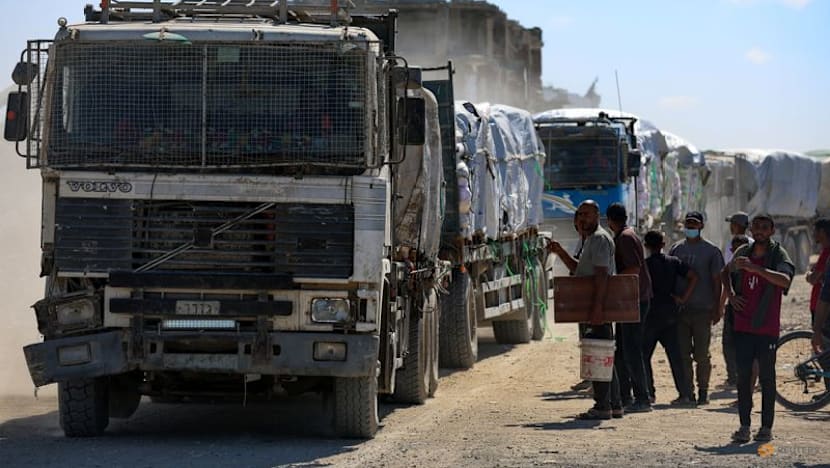Israel cuts agreed aid into Gaza over slow release of hostage bodies
The Israeli military body COGAT, which oversees aid flows, said that aid deliveries would be reduced from 600 to 300 trucks a day.

GENEVA: Israel will only allow half the agreed number of aid trucks into Gaza starting Wednesday (Oct 15), according to a note seen by Reuters and confirmed by the United Nations, in a setback to hopes food and supplies would be quickly ramped up to ease famine in the enclave.
COGAT, the Israeli military arm that oversees aid flows into Gaza, also notified the UN that no fuel or gas will be allowed into the enclave except for specific needs related to humanitarian infrastructure. COGAT did not immediately respond to a request for comment.
COGAT blamed Hamas for a slow release of hostage bodies for the decision to limit aid trucks to 300 daily. The militant group has said locating the bodies is difficult.
"Hamas violated the agreement regarding the release of the bodies of the hostages held in the Gaza Strip. As a result, the political leadership has decided to impose a number of sanctions related to the humanitarian agreement that was reached," read the COGAT note.
So far, Hamas has handed over eight coffins of dead hostages, leaving at least 19 presumed dead and one unaccounted for still in the Gaza Strip.
"We have received this communication from the Israeli authorities," Olga Cherevko, a spokesperson for the UN Office for the Coordination of Humanitarian Affairs in Gaza, told reporters. "We certainly very much hope that the bodies of the hostages are handed over and that the ceasefire continues to be implemented."
COGAT had said on Friday that it expected about 600 aid trucks to enter Gaza daily during the ceasefire. COGAT told the UN that 817 trucks had entered Gaza on Sunday, said Cherevko. It was not immediately clear how many trucks entered on Monday, deputy UN spokesperson Farhan Haq said.
"Crossings are not open today for the entry of supplies from the Israeli side, but we are collecting supplies from within Gaza today," Haq said on Tuesday.
Israel requires aid to be offloaded from trucks on the Palestinian side of the border, where it then has to be collected by the UN and aid groups already in Gaza.

CROSSINGS NEED TO OPEN, AID AGENCIES SAY
Israel has delayed plans to open the southern Rafah border crossing to Egypt, three Israeli officials said earlier on Tuesday.
"We need all crossings open. The longer Rafah stays closed the more the suffering prolongs for people in Gaza, especially those displaced in the South," UNICEF spokesperson Ricardo Pires said. US President Donald Trump declared an end to the Israel-Hamas conflict on Monday as the last living Israeli hostages were swapped for Palestinian detainees, raising expectations that aid supplies would be rushed into the enclave where a global hunger monitor has warned hundreds of thousands of people face famine.
"We are still witnessing only few trucks coming in, and large crowds approaching these trucks in a way that does absolutely not conform to humanitarian standards," ICRC spokesperson Christian Cardon told reporters in Geneva on Tuesday.
The UN World Food Programme said on Tuesday that it has brought in 137 trucks since the weekend. Aid agencies are seeking to rapidly scale up supplies to people in Gaza City, where up to 400,000 people have not received assistance for several weeks, according to the WFP.
UNICEF spokesperson Tess Ingram said it has been able to bring in dozens of trucks with life-saving supplies, such as family tents, plastic tarpaulin sheets, winter clothes and hygiene kits.
The UN and aid groups have been able to move more freely across parts of Gaza from which Israeli forces have withdrawn, Haq said. Throughout the war the UN had complained of obstacles to delivering and distributing aid in Gaza, blaming impediments on Israel and lawlessness.
"This improved access has allowed partners to scale up the response to the most urgent needs," he said.
AGENCIES FACE ONGOING RESTRICTIONS
Around 50 international aid groups, including the Norwegian Refugee Council, CARE and Oxfam, have still not received clearance for supplies to enter as they face ongoing registration barriers.
"We're in this limbo ... The needs of a population that has experienced famine over a period of months is not going to be met with a few trucks," Bushra Khalidi, an Oxfam policy adviser, said.
COGAT previously said that aid trucks operated by the UN and "approved international organisations", the private sector, and donor countries would be allowed to enter Gaza. Catholic Relief Services has, however, received permission to bring in supplies with shelter as a priority, Jason Knapp, an official with the organization, told Reuters from Gaza.
US-BACKED AID GROUP PAUSES OPERATIONS
The US-backed Gaza Humanitarian Foundation said it has temporarily paused its operations. It last distributed aid on Friday and has dismantled one of its four distribution sites, said a GHF spokesperson, adding that the site could reopen elsewhere in Gaza.
The GHF says it currently has funding to continue operating until the end of November and that while it would make "tactical adjustments" to its operations, it was still committed to delivering aid to as many people in Gaza as possible.
Israel and the United States wanted the UN to work through the GHF, but the UN refused, questioning the neutrality of the GHF and accusing the distribution model of militarising aid and forcing displacement.
The United Nations human rights office said in July that it had recorded more than 600 deaths of people seeking aid - near GHF sites and UN aid convoys. For the past several months, UN data showed that most of its aid was looted off trucks in Gaza either by hungry people or armed groups.














